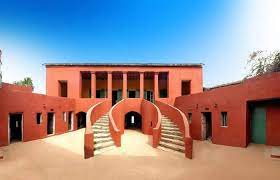APA-Dakar (Senegal) After more than three years work, the world-renowned slave house on the islan of Goree in Senegal has been completely renovated.
The place is symbolic and its history dramatic. Preserving its memory is a duty. For over three years, a multidisciplinary team has been working to ensure the lasting vitality and impact of the ‘Maison des
Esclaves de Gorée’ (Gorée Slave House).
“Transatlantic slavery, marked by historical silence and invisibility, is in fact the greatest human tragedy. The work we have accomplished is therefore of the utmost importance, because we are restoring this place of memory to its full depth and vitality. In so doing, we are transforming this story of tragedy into a dimension of resistance, of
the conquest of humanity by those who were enslaved and whom we have forgotten, and of the struggle waged by their descendants in slave-owning societies in the face of racism,” said Project Advisor Doudou Diene.
The work, the fruit of partnership between the State of Senegal and the Ford Foundation, cost $1.8 million and also enabled the renovation of the museum tracing the triangular trade from the island.
“The interpretation center we’re opening today is much more than just a building. It’s a place where we can delve into the depths of this island and the events that have shaped it. It represents a place where knowledge converges, a space dedicated to discovery, a crossroads where cultural enthusiasts, researchers… can come together to explore, exchange ideas and broaden horizons through workshops and educational programs,” Minister of Culture, Aliou Sow declared.
Among the innovations updated in the museum are panels exploring the role and life of women on Gorée Island; spaces for meditation; artworks by contemporary Senegalese artists, all in a scenography that encourages visitors to make connections between the site’s history and new forms of violation, from sex trafficking to forced migration.
“When visiting this exhibition, we need to keep in mind that slavery was not just a chapter in history, but a complex system that left deep traces in societies around the world. These works do more than expose
the horrors of the past. They are also a call to action for justice and equality,” Mr. Sow noted.
To further popularise the history of the ‘Maison des Esclaves de Gorée’, curator Eloi Diouf stressed the need to digitise its historical heritage.
Development Agency (AFD) and other stakeholders.
Aliou Sow also endorsed the idea of creating a worldwide network of places of memory of slavery, with Gorée as its center.
ARD/ac/fss/as/APA
|
ReplyForward
|


